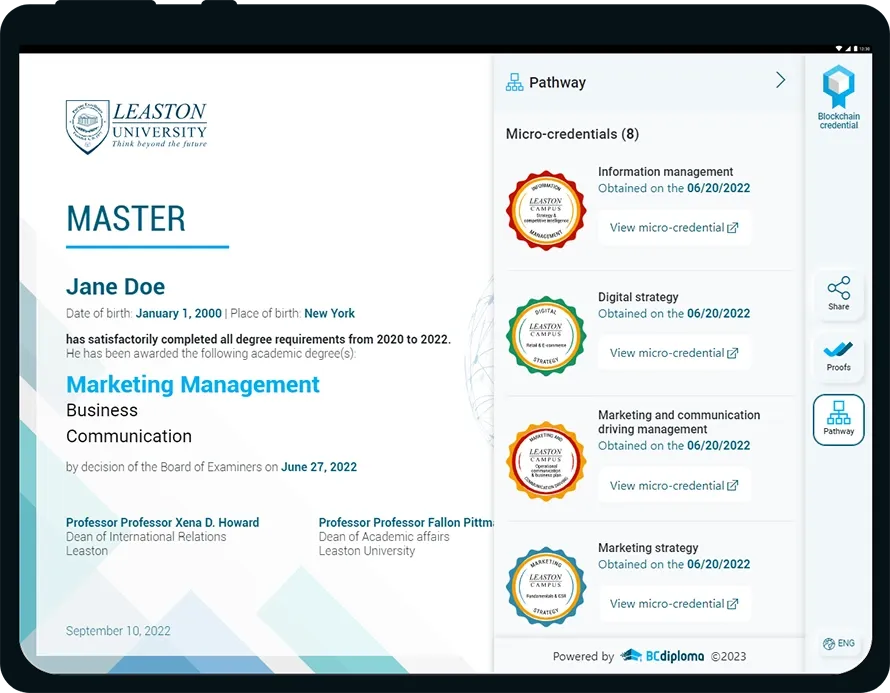According to a study conducted in 2022 by the French General Directorate of Enterprises (DGE), in partnership with the Research Center for the Study and Observation of Living Conditions, CREDOC, 81% of business leaders are convinced of the advantages of digital tools in today’s world. At a time when more and more organizations are digitalizing their sales processes and internal management activities, rethinking the awarding of certifications and diplomas and the promotion of training has become a key issue for higher education and training institutions needing to evolve in response to an increasingly competitive market.
With this in mind, why not opt for digital credentialing, an intuitive and secure credential system conducive to the success of your digital transformation? This is exactly the choice made by IFAG, the school of management specializing in innovation and entrepreneurship and belonging to the Skills and Development Network (Réseau Compétences et Développement). In this article, with BCdiploma and Delphine Gourouvin, Project Manager of the IFAG Information Systems Department, discover how to bring digital credentials into your procedures and make your digital transformation a resounding success.
What do we mean by “digital transformation”?

A profound change in working methods
The term “digital transformation” refers to the integration of digital tools and processes into the internal operational systems and procedures of a company or organization. A digital transformation concerns every aspect of work activities, from the adoption of management software through to the digitalization of calendars, administrative tasks and educational and training resources.
Though digital transformation, in this day and age, has truly become a necessity, especially for higher education institutions, some sectors such as healthcare and the automotive industry are struggling to fully implement it.
Assessing internal procedures in order to better digitalize them
Before embarking on a digital transformation, a company must carefully assess their operations to identify issues affecting efficiency. For example, in the context of the recent health crisis, IFAG encountered various challenges in the publishing and issuing its diplomas, issues that the school of management sought to solve in partnership with BCdiploma. Once inefficiencies have been identified through a meticulous audit of the entirety of internally applied procedures, a digital transformation strategy may be crafted to close all of the gaps. At IFAG, this process was carefully overseen by the:
- Brand Director
- National Pedagogical Director
- National Pedagogical Coordinator (for Data Integration)
- Information Services Department
How to succeed in your digital transformation, thanks to digital credentials

The end of paper diplomas in favor of digital credentials
Editing, printing, sending, delivery: the life cycle of a paper diploma is a long, drawn-out process, from the first draft through to its delivery to students or trainees. Paper diplomas are expensive to produce and practically impossible to modify once in the hands of their recipients. What is more is that it takes the work of several people to produce and process them, who could otherwise better devote themselves to other tasks, if the diplomas were rather digitalized and issued digitally.
Thanks to digital diplomas, the time and costs of editing diplomas can be drastically reduced, and modifying the information is a piece of cake. A simple click is all that is needed to update a name or to rectify grades achieved. For IFAG, the main challenges of its digital transformation that BCdiploma was able to meet were the:
- Issuing of secure digital diplomas
- Guaranteeing of their traceability and delivery to recipients
- Reduction of printing costs, labor costs and issues misplacing diplomas
A digital solution that facilitates access to new markets
Though some skeptics may still be loyal to paper-based diplomas, it is important to recognize their limits in conquering new markets and potential new sources of revenue. For example, it is much faster, easier and cheaper to send digital credentials to international students or recruitment organizations than to send a physical certificate by post.
“How can students attract an employer quickly to their profiles?” This question, raised by Delphine Gourouvin on behalf of graduate students, perfectly summarizes issues relating to the digitalization of credentials. Since the amount of information that can be contained in a digital credential is much more than can be contained on a paper diploma, recruiters can more easily compare all the skills acquired by different candidates through their digital credentials.
Digital credentials, a source of additional revenue

An example of a digital certificate with the “Pathway” panel open
“The publishing of physical diplomas generates a labor cost that is non-negligible, but that we do not always account for.”
Since digital credentials promote evolving educational pathways that can be rewarded by acquiring a series of micro-certifications, they allow additional sales and revenue to be made, and therefore offer a significant investment return. By automating procedures through digital transformation, higher education institutions such as IFAG have optimized costs and the use of salaried resources, and given a long-term boost to their revenue streams.
The possibility of adding a validity date to digital credentials can also encourage the renewal of skills, new enrollments, and new turnover..
Easier diploma sharing for more visibility
“Students will be able to put their diplomas immediately on LinkedIn, and therefore increase their visibility on the job market, whether they are currently looking for a job or not.”
Easily shareable on social media, and in digital CVs and email signatures, digital credentials, such as those offered by BCdiploma, are a fantastic, low-cost marketing tool. As Delphine Gourouvin comments, “Students will be able to put their diplomas immediately on LinkedIn, and therefore increase their visibility on the job market, whether they are currently looking for a job or not.” The age of scanning, photographing and retouching diplomas and certificates is over. Students can now celebrate and advertise their success in just one click, thanks to the “Call To Action” buttons directly integrated into digital credential delivery emails.
By posting their digital credentials on the web, recipients become brand ambassadors for their education and training organizations, boosting brand visibility across social networks and contributing to the digital transformation of marketing and communications processes.
Getting help from professionals: the secret to a successful digital transformation
Personalized support for flawless integration
“Everything is arranged to make handling the tool easier, and to have monitoring and checks there before you press send.”
Since digital credentials are cutting-edge technology that must be implemented with care, in order to be perfectly effective, BCdiploma fully supports and accompanies you in your digital transformation, offering a wide range of customizable and secure digital credentials and micro-credentials. 100% registered on a public blockchain and issued in single copy, our digital credentials guarantee the security and validity of all your diplomas and certificates, as an essential part in the success of your digital transformation.
In her feedback to BCdiploma, Delphine Gourouvin highlighted the personalized, intuitive support provided by our company, particularly in the rapid and continuous training of IFAG’s IT teams. Where certain organizations offer 10 to 15 hours of training just to get started with digital credential editing and issuing, we can familiarize users with the process in 1 to 2 hours, while providing you with comprehensive online guides and resources, and remaining at your full disposal for any questions or doubts. “Have any doubts? Make a phone call, send an email, and have it all explained again,” emphasizes IFAG’s Information Services Department Project Manager.
The culmination of a successful digital transformation
For IFAG and Delphine Gourouvin, the digital transformation has been a resounding success! With faster transmission of diplomas welcomed by students, simplification of editing procedures, and support for the centralization of data, BCdiploma has enabled the management school to focus on celebrating graduations, rather than on the long and tedious task of editing and issuing paper certificates. The collaboration between IFAG and BCdiploma is far from over, since we are deploying our micro-credentials across all the brands of the Skills and Development Network (Réseau Compétences et Développement)..
To learn more about the process of creating digital credentials, check out the numerous articles on our blog, or book a demo!
